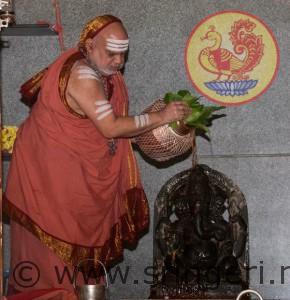Kumbhabhisheka at Maavinakatte

On 10th May 2015, Jagadguru Shankaracharya Sri Sri Bharati Tirtha Mahasannidhanam and Jagadguru Shankaracharya Sri Sri Vidhushekhara Bharati Sannidhanam graced Maavinakatte near Sringeri. Sri Mahasannidhanam performed the Jeernodharana Kumbhabhisheka of Lord Aane Vighneshwara and Sri Brahma Jatikeshwara. Sri Sannidhanam then performed the Shikhara Kalashabhisheka.
In the public function that followed, devotees offered Phala Samarpanam along with their reverential pranams to the Jagadgurus.
Sri Sannidhanam, in His Anugraha Bhashanam, said that we belong to the Parampara of Astikas i.e. having firm conviction in the existence of God, the all-pervasive witness of all our actions and the dispenser of the fruits of our actions. Accordingly, our ancestors had great faith in God and lived their lives oriented towards God and devoted to Him. Sri Sannidhanam stressed that giving up ego, desire and anger are the prerequisites to developing purity of mind and will develop steadfast devotion.
Sri Mahasannidhanam, in His Anugraha Bhashanam, said that for the well-being of a village and its villagers, temples have to be maintained and worship must be offered regularly. Everyone in the village must devotedly do one’s bit to ensure the functioning of the temple. There is nothing that God needs from our Puja. What could the ever-content, omnipotent Lord want from us? Sri Adi Shankaracharya says, “O Lord! What is it that I can offer You? For You have the golden Meru mountain itself with You. Kubera, the God of wealth stands by Your side waiting for Your command. There is nothing unique that can be offered to you, for the wish-fulfilling Kamadhenu, Kalpavriksha and Chintamani are right beside You. When the crescent moon itself decorates Your head, what other pleasant things can be offered to You?” So, Sri Adi Shankaracharya states that the only thing that can be offered to the Lord is one’s own mind कमर्थं दास्येहं भवतु भवदर्थं मम मनः.
Everyone who desires his own welfare must develop devotion. We find in the Puranas that the Lord has delivered many different kinds of devotees from suffering and distress. Who protected the young Prahlada from his evil father? Who saved Draupadi from dishonour in the royal assembly? Who offered shelter to Vibhishana, who sought refuge on being insulted by his own elder brother? Who blessed the little Dhruva who had suffered at the hands of his stepmother? Who saved Gajendra, the elephant that had given up all hope after being caught by a crocodile? The commonality in all these devotees is their surrender to the Lord. We must remember Bhagavan Krishna Paramatma’s words –
यत्करोषि यदश्नासि यज्जुहोषि ददासि यत् ।
यत्तपस्यसि कौन्तेय तत्कुरुष्व मदर्पणम् ॥
“Whatever you do, whatever you eat, whatever you offer as a sacrifice, whatever you give away, whatever penance you do, offer it to Me.” That is why, even when doing a Puja, we offer everything unto the Lord by stating so at the end.
The Jagadguru said that it is to be remembered that the Lord is One even if the names and forms are many. Shiva, Vishnu, Ganapati, Devi, Subrahmanya, Ayyappa etc. are all, in essence, the same Divine Consciousness. Even an ordinary institution cannot have two heads or leaders at the topmost level. For, if there were two such heads, how would the members of the institution know which leader’s instructions to follow? Likewise, the Lord is One, though sporting different forms to bless devotees.
The Jagadguru blessed the devotees assembled at Maavinakatte for their efforts in renovating and arranging the Kumbhabhisheka of the temple of Sri Ganapathi and Jatikeshwara, and expressed joy in having worshipped the Lord and performed the Kumbhabhisheka.

